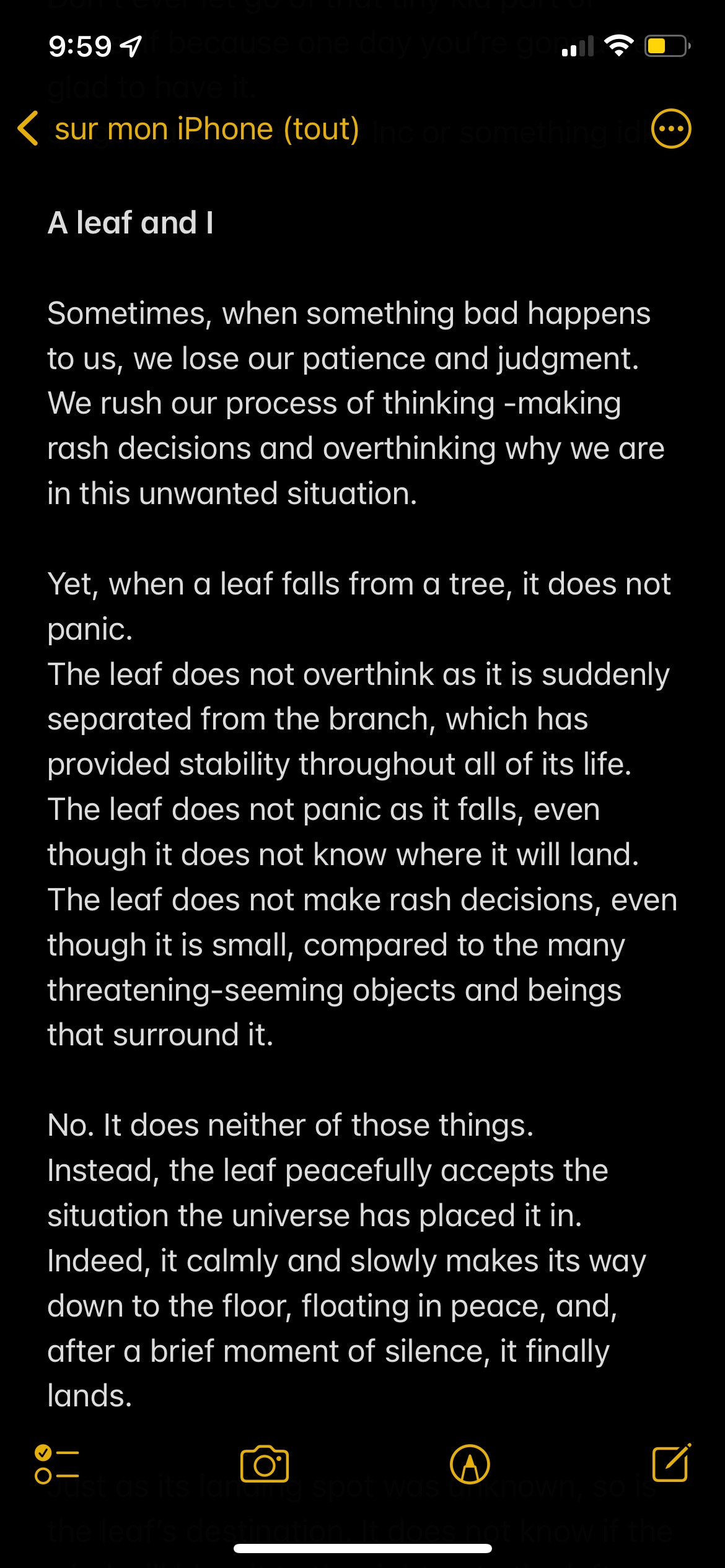My Leaf and I
In my penultimate post, and final essay, I reflect on Enzo's own contemplation of acceptance.
Cyrano: The leaves—
Roxane: What color—Perfect Venetian red! Look at them fall.
Cyrano: Yes—they know how to die. A little way
From the branch to the earth, a little fear
Of mingling with the common dust—and yet
They go down gracefully—a fall that seems
Like flying!
― Edmond Rostand, Cyrano de Bergerac
I had planned this final essay of reflections on my son Enzo’s death to be a look back at this past year—an attempt to glean from what I have written some unifying meaning or theme. However, a few days ago, a good friend called me and, with tears in his voice, informed me that, on the previous night, a close friend of his had lost her son. The young man, her only child, was killed driving home, and his mother was distraught from sorrow. We spoke for some time, and I shared my thoughts on how to help his friend survive what was about to be the most horrible week of her life.
I thought a lot about that phone call over the past few days, coming, as it did, as my family and friends prepare to mark the first anniversary of Enzo’s death. Somewhere, a mother and father I do not know are beginning the heart-rending year-long journey I am about to complete. I suspect they will experience the same emotions I felt, and I wondered what I could say to them about the loss, sorrow, guilt, and moments of peace and inspiration I have tried to chronicle over the last twelve months. I tried to imagine what hope I could give someone who has lost everything and wonders how, and if, she can go on.
A few days before receiving that call, I did something I had avoided all year: I turned on Enzo’s phone and laptop. I hadn’t the heart to look through their contents until now, but it seemed to me the time had come. I sat alone in my office and spent a silent hour looking through the digital remains of his life. In them, I found the usual artifacts of a young man’s existence: social posts, photos with friends, and a few assignments from school. Contained among the ordinary items, however, I discovered some short reflections and poems that Enzo had written, perhaps for friends or maybe for himself. Reading through them, I had to pause when I reached the one below:
Reading his words, it struck me that Enzo’s meditation was a succinct encapsulation of the Stoic ideals that have carried me through this year. In his own words, I could suddenly imagine his consolation to me, urging me to be like the leaf and to accept with dignity and calm whatever the universe brings into my life. Nature, Enzo was saying to whoever would listen, has the final say in everything, and what it decrees must be accepted as what must be.
Contemplating Enzo’s lines and the year I have lived without him, I found myself returning to a poem I had not considered since college. It is William Wordsworth’s masterpiece, “Ode: Intimations of Immortality,” which opens with these lines:
There was a time when meadow, grove, and stream,
The earth, and every common sight,
To me did seem
Apparelled in celestial light,
The glory and the freshness of a dream.
It is not now as it hath been of yore;—
Turn wheresoe'er I may,
By night or day.
The things which I have seen I now can see no more.Wordsworth laments that the innocence and wonder with which he saw the world as a child is gone, erased by the sorrows and burdens of adulthood. Throughout the poem, he longs to return to his youth and to see the world with the eyes of a child. At one point, he notices a tree and a flower, and in them he recognizes what he has lost by living beyond childhood:
—But there's a Tree, of many, one,
A single field which I have looked upon,
Both of them speak of something that is gone;
The Pansy at my feet
Doth the same tale repeat:
Whither is fled the visionary gleam?
Where is it now, the glory and the dream?As the poem continues, he proposes that we all share a common, divine source, which is perceived in youth but lost in age:
The Youth, who daily farther from the east
Must travel, still is Nature's Priest,
And by the vision splendid
Is on his way attended;
At length the Man perceives it die away,
And fade into the light of common day.As the poem nears its close, Wordsworth finds consolation in remembering what he once had and accepting that if he cannot again wonder over his world as a child, he can contemplate it as a man:
Though nothing can bring back the hour
Of splendour in the grass, of glory in the flower;
We will grieve not, rather find
Strength in what remains behind;
In the primal sympathy
Which having been must ever be;
In the soothing thoughts that spring
Out of human suffering;
In the faith that looks through death,
In years that bring the philosophic mind. The work ends with the realization that what remains for him is nature, and that even the simplest flower can be a conduit to the deepest part of our memory and soul:
Thanks to the human heart by which we live, Thanks to its tenderness, its joys, and fears, To me the meanest flower that blows can give Thoughts that do often lie too deep for tears.
After reading Wordsworth, I realized that what the poet says about his youth should be the last thing I say about Enzo. When he lived, I saw the world through his eyes, reveling in the wonder of his discoveries and growing comprehension. Now that he is gone, I lament not only his loss but also that I can never again see the world in the same way. Like Wordsworth, I have lost the “celestial light” each child brings to a parent. Like him, all that remains for me is the recollection and inspiration of that light in my daily life. In my quotidian reflection on Enzo’s existence, I can recall who he was and what he meant, and in that remembering, I can, like Wordsworth, make peace with what I have lost. I can also take solace in the knowledge that Enzo did not live long enough to lose what Wordsworth longs to regain and that my son died wrapped in the mantle of youth, seeing the world, to his very last moment, with the calm appreciation that his words convey so eloquently.
Returning to those parents and their son’s tragic fate, I conclude that if I could speak to them, I would tell them that the serene life they had before losing their son died with him. As I wrote in one essay, there can be no going back to the day before, and the inevitable guilt, however deep, should not consume them, for their son’s death has no origin in anything he or they did. His death is simply an awful accident of our infinitely random universe, and no person or religion can give it rhyme or reason, no matter how many different ways you ask. I would also tell them that, in time, their minds will come to accept what happened to their boy and that they will go on, carrying his memory with them always and finding in their reminiscences a joy for the years they shared. Like Wordsworth, they must live acknowledging what they have lost and they will live nonetheless. Eventually, and though it may seem impossible now, they will find portals that will carry them back to their life with their son. These invisible passages are all around them, though they lie hidden, for now, in the flood of grief that envelopes them. One day, those waters of sorrow will recede and allow the flowers of cherished memories to bloom.
As for me, I end this final essay with the closing lines of one last poem, “The Future,” by Matthew Arnold. These thoughts encapsulate the calm I have come to experience as I face the life that is left to me, unknowingly having heeded Enzo’s thoughtful admonition and learned, a year after his death, to understand—really understand—that my beautiful leaf fell to the ground in peace. Enzo’s gentle words are my deepest philosophy, and their acceptance is my final, only, and sacred consolation.
But what was before us we know not, And we know not what shall succeed. Haply, the river of Time— As it grows, as the towns on its marge Fling their wavering lights On a wider, statelier stream— May acquire, if not the calm Of its early mountainous shore, Yet a solemn peace of its own. And the width of the waters, the hush Of the grey expanse where he floats, Freshening its current and spotted with foam As it draws to the Ocean, may strike Peace to the soul of the man on its breast— As the pale waste widens around him, As the banks fade dimmer away, As the stars come out, and the night-wind Brings up the stream Murmurs and scents of the infinite sea.






Hi Finnoula: It heartens me to know he had friends who shared his love for writing and poetry. Thank you for reading, for sharing your thoughts, and for carrying his memory in your heart, especially today.
Querida Ana: gracias por tus amables palabras y por recorrer conmigo este camino que ahora llega a su fin. Si lo que he escrito ha iluminado un poco más lo que es especial en la vida, entonces el esfuerzo valió la pena. Un fuerte abrazo, Carlos